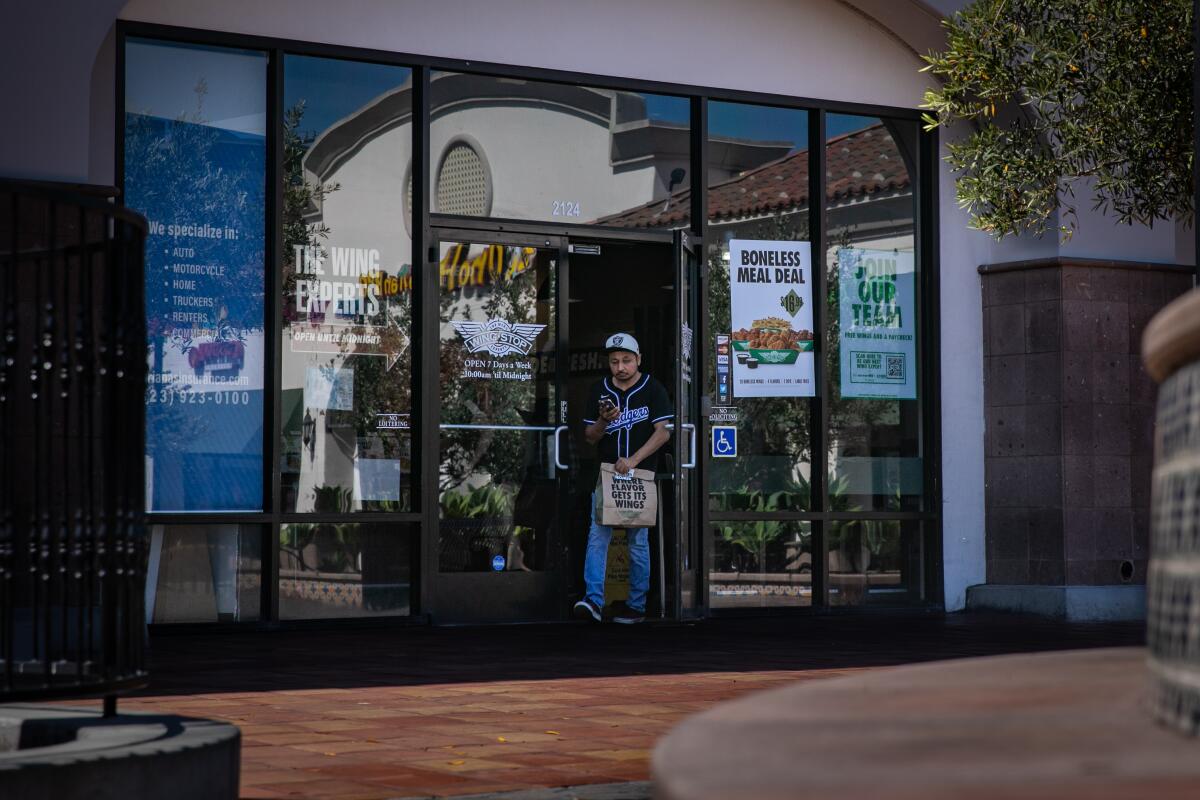Wingstop owners to pay more than $667,000 to settle wage theft accusations

Cecilia Baza, 25, said she knew the whole time she worked as a cashier at a Wingstop restaurant in East Long Angeles that she was not earning minimum wage.
She learned from her mother, who also worked a minimum wage job, that large employers in unincorporated L.A. County were required to pay workers at least $15 per hour by July 2020 — up from $14.25 the year before.
As of June 2020, she said she was making $13.
She said she pointed out that she was making less than the legal hourly minimum to her employers, but they “didn’t budge.” So she asked the county, which sets the minimum wage for the area.
Baza’s inquiry — along with the pay stubs she provided — set off alarm bells inside the county’s Department of Consumer and Business Affairs. After a two-year investigation, the department announced this week that two Wingstop locations in unincorporated L.A. County will pay more than $667,000 in fines and back wages.
Far West Restaurant Group, which franchises the two Wingstops, agreed to the settlement — the largest since the county’s minimum wage law went into effect in 2016, setting the wage floor for all businesses operating in unincorporated L.A. County.
After auditing payroll records and time cards and interviewing employees, the county found the two Wingstop locations repeatedly flouted the minimum wage rules from 2017 to 2021, shortchanging their employees by as much as $2.25 per hour, and issued a wage order against Far West. The minimum wage is now $16.90 per hour in unincorporated L.A. County.
“If you’re working full time and being ripped off $2.25 per hour, that’s almost $400 a month,” said Rafael Carbajal, director of the Department of Consumer and Business Affairs. “Four hundred dollars is a lot of money for folks living on minimum wage.”
A vice president for Far West Restaurant Group declined to comment, and an email to the company’s founder was not answered. Wingstop did not respond to a request for comment.
Because the Department of Consumer and Business Affairs has jurisdiction over wage issues only in unincorporated parts of the county, Carbajal said it could investigate only the two Wingstops in these areas — one in East Los Angeles where Baza worked and the other in Walnut Park. Both are in lower-income areas with a high proportion of minimum wage workers.
The county did not look into the wage practices of Wingstops operated by Far West Restaurant Group in the county’s incorporated cities.
The settlement — $667,414.05 in total — is the latest in a string of recent legal actions in which Far West Restaurant Group was accused of cheating workers. In the last four years, four employees at L.A. County locations have sued the company, alleging wage theft. A class-action lawsuit filed in May alleged employees were not paid for hours worked and often worked through mandated meal periods.
As part of the settlement, which came in response to a wage order issued by the county, Far West will pay about $192,000 in back wages and $475,000 in fines. The fines will go to both the county and the 309 employees who worked at the two locations from 2017 to 2021. One employee will get $17,000 in fines and back pay.
County Supervisors Holly Mitchell and Hilda Solis, in whose districts the two Wingstops are located, both issued statements praising the worker who had brought the wage violations to the county’s attention.
“Every worker deserves a fair and safe work environment where exploitation and abuse have no place,” Solis said.
“We will not tolerate corporate excess profiting off the backs of our working families,” Mitchell said.
Baza said that after three months at Wingstop, she left the job in June 2020 because she wasn’t making enough to live on. That same month, she contacted the county to see if it could help the colleagues she’d left behind.
“I always felt like people could take advantage of you unless you speak up,” she said. “I’m glad that they’re getting what they deserve, what they’ve been robbed [of].”
More to Read
Sign up for Essential California
The most important California stories and recommendations in your inbox every morning.
You may occasionally receive promotional content from the Los Angeles Times.











